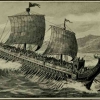Fourth, the quality of information depends on several critical aspects, such as content that is accurate, relevant, complete, and not excessive; timely delivery so that it is available when truly needed; and a clear and understandable presentation format. The value of information can also be measured by how beneficial it is compared to the cost of obtaining it, as well as its effectiveness in supporting decision-making. Good information must be accurate, timely, relevant, complete, and easy to understand. High-quality information enhances knowledge, reduces uncertainty, and supports the processes of planning, controlling, evaluating, and developing organizational activities.
The conclusion is facts give rise to theories, and data are processed into information. High-quality information must be accurate, relevant, timely, useful, and capable of supporting decision-making in managing and developing an organization.
This text is adapted from the teaching module of the Educational Management Information Systems course Part 2, Lecturer Prof. Dr. A. Rusdiana, M.M.

Follow Instagram @kompasianacom juga Tiktok @kompasiana biar nggak ketinggalan event seru komunitas dan tips dapat cuan dari Kompasiana. Baca juga cerita inspiratif langsung dari smartphone kamu dengan bergabung di WhatsApp Channel Kompasiana di SINI








